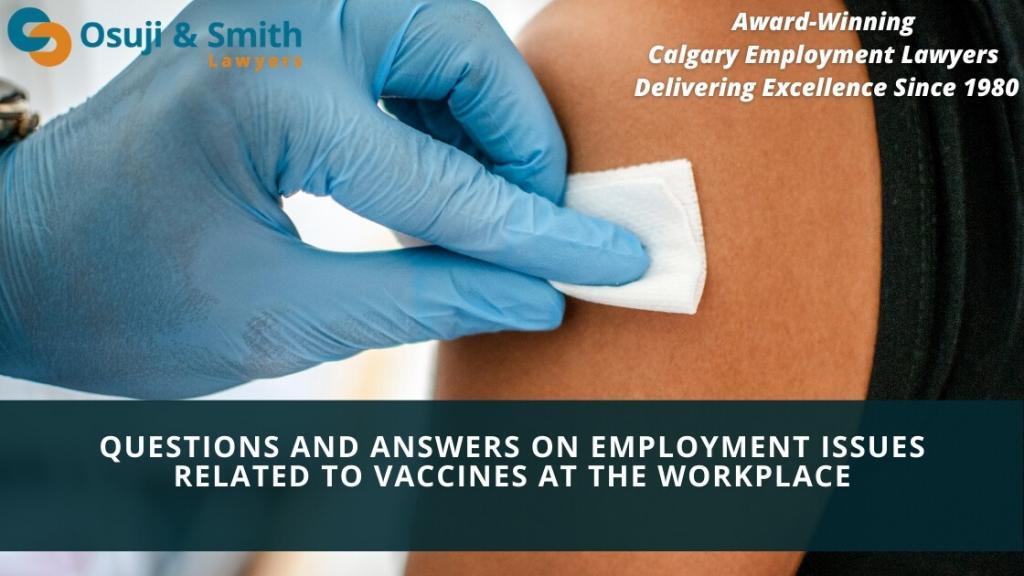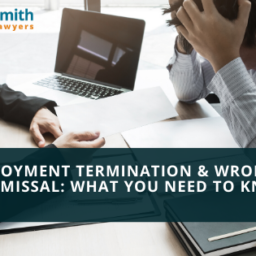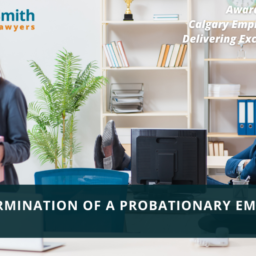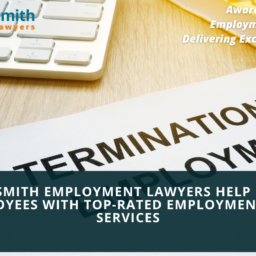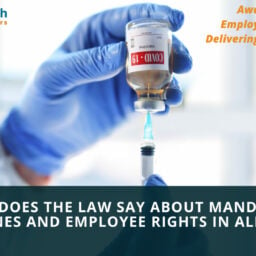Questions And Answers On Employment Issues Related To Vaccines At The Workplace
What does the law say about mandatory vaccines and employee rights in Alberta?
Question #1:
With the pandemic and potential vaccine deployment what should employers know about their legal obligations when it comes to having their employees vaccinated to come to work?
Firstly, note that this is an ever evolving situation and as time progresses things may change, because as of today, there has not been any legislation passed by any provincial or federal government that would make the COVID vaccine mandatory.
- Employers Obligations overall:
- Occupational Health and Safety are a critical source of employers’ legal obligations that impose an overarching duty on employers to exercise every reasonable precaution to provide a safe work environment for the employees. Failure to exercise due diligence to fulfil their Occupational Health and Safety duty risks liability.
- Employment Standards which set out minimum standards for employment which include a minimum amount of unpaid sick leave.
- Human Rights which prohibit employers from discriminating against employees based on personal attributes such as disabilities and ethnicity. Employers have a duty to accommodate, a duty to offset discriminatory workplace rules and policies by adjusting them accordingly to offset undue hardship.
- Privacy Laws which regulate an employers’ ability to collect, disclose and use personal information especially as it pertains to ones health.
- Contracts – individual employment contracts or collective agreements also come into play subject on the issue at hand.
- It is noteworthy that a lot of provinces are planning on introducing proof of vaccination cards. Although employers may want their employees to show them these cards during their transition back to work, there are privacy laws in place that prohibit employee’s health records without their written consent.
- In addition, an employee may have a valid medial or religious ground for refusing to obtain the vaccine and that will trigger the employer’s duty to accommodate.
Question #2:
Can you force your employee to get vaccinated?
Answer
- This is subject to several variables, notably, though, it is heavily influenced by the nature of the workplace and the current existing policies the employer has in place.
- Mandatory vaccination policies may come up for industries such as healthcare and senior living facilities. These places would have strong grounds for implementing a mandatory policy vaccinations, keeping in mind that industries that are exposed to the care and wellbeing of a demographic that are vulnerable to flus and COVID-19 likely already have mandatory flu shot policies in place.
- For these industries, there is case law where employee’s refusal to comply with the mandatory flu shot requirements constituted cause for dismissal.
- Example: in one case, a nurse that worked at an adult care facility that took care of the elderly, refused to comply with a mandatory influenza immunization policy, which was a necessary condition of her employment. Her refusal to do so would result in her dismissal.
- Because of the nature of her work, the employer provided evidence of the risks the flu had on their residents, the very residents the employee had day-to-day interactions with. Provided the employee was a nurse, it was proven that she knew or ought to have known of the risks.
- It was also decided that the employer had a legitimate interest in the residents’ wellbeing and health; therefore, imposing a vaccination of their employees was not unreasonable and the termination of the employee’s employment was upheld.
- However, outside of these respective industries that specifically cater to the health and wellbeing of a vulnerable demographic, employers will be faced with greater challenges in implementing a mandatory vaccination policy on employees.
- Although a case can be made for workplaces that are dependent on working close in proximity to one another or that service the general public, an employer would need to show that the vaccine is bona fide occupational requirement and that the individual cannot be accommodated without undue hardship before it could overcome any accommodation challenges.
Question #3:
What rights does your employee have?
Answer:
- Privacy-
- Personal health information is highly sensitive and inherently private, subject to the workplace and industry. Employers and employees should keep in mind that even asking an employee whether they have had the vaccination and requesting proof is a collection of personal information, which triggers privacy considerations. If an employee feels uncomfortable with disclosing this information and has concerns of possible discrimination based on medical or religious beliefs, they should get in touch with a lawyer to further discuss their legal rights and their employers’ legal obligations.
- Duty to Accommodate
- Your employer has an obligation to provide a safe work environment as per the Occupational Health and Safety regulations in place. This includes implementing preventive measures, compliance with safety measures and staying away from work if an employee has a reasonable basis to believe they are infected or have been in contact with someone that has been infected.
- If an employee has requested an accommodation of a protected characteristic under human rights laws, the employer is entitled to the information it needs in order to comply with their duty to accommodate, and the employee is obliged to provide it.
Question #4:
What should businesses implement?
Answer:
- Businesses should have a continuity plan in place or a pandemic/ infectious disease response policy.
- In order to ensure a company is in compliance with Occupational Health and safety requirements, companies have an obligation to communicate with their employees about the risk of diseases which include COVID-19. The employer needs to keep its employees updated on risks and tips to avoid contracting and spreading it based on information from reliable sources. It is advisable to require a staff to stay on top of government advisories.
- Employers should also have reasonable controls in place to safeguard against workplace hazards. What is considered “reasonable” will depend on the work place. These include:
- Having infection control materials available such as hand sanitizers and masks.
- Advising employees to call in sick if they have symptoms.
- Rearranging the workplace to minimize physical contact.
- Temporarily allowing employees to work remotely.
- Employers should cancel all large gatherings.
- Companies should consider updating their employment contracts to include conditions that comply with OHS, Employment Standards and Human Right laws, but that defines parameters regarding a pandemic outbreak.
- Employers should keep in mind that asking an employee whether they have received the vaccination and requesting proof is a collection of personal information and triggers privacy considerations. However, as the matter continues to unfold, it is recommended that businesses keep a close eye on the vaccination system implemented in Canada and Alberta as the employer’s obligation to ensure the health, safety and welfare of its workers as well as their clients, must be balanced with the employee’s rights to privacy and as noted, this is subject to many things such as the industry and workplace environment.
If you have any questions concerning your rights as an employer or employee, please contact the award-winning Calgary employment lawyers at Osuji & Smith.
Author: Amanda Ovaici
What does the law say about mandatory vaccines and employee rights in Alberta?


